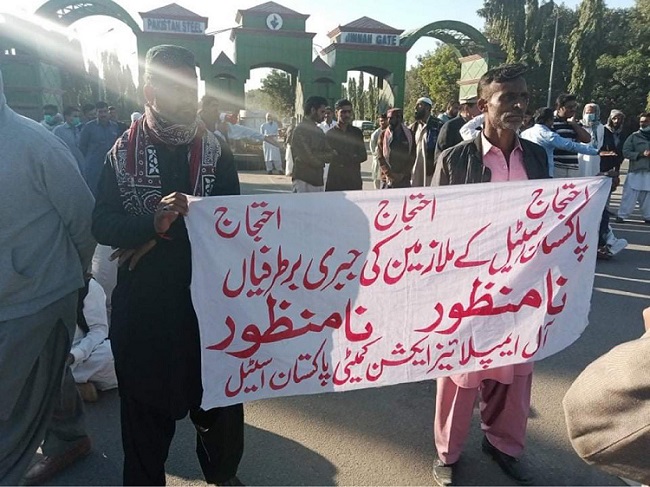
Islamabad’s decision to lay-off 4,544 employees of the debt-ridden Karachi-based Pakistan Steel Mills (PSM) has ignited a political war between the government and Pakistan Peoples’ Party (PPP). From a purely economic point of view, retrenchment on such a massive scale was inevitable since Pakistan Steel Mills has proved to be a liability with an accumulated debt of more that 200 billion rupees with no scope of graduating into a profit making venture. But laying-off such a large number of workers (and that too during Covid-19 pandemic) has raised serious concerns and given the PPP yet another good reason to attack the Imran Khan government.
Whereas Federal Minister of Industries and Production, Hammad Azhar has claimed that the laid-off employees were being paid an amount equivalent to two year’s pay, in a tweet, PPP leader Bilawal Bhutto Zardari termed this large-scale sacking of PSM employees as the handiwork of a “heartless government” and vowed that his party “will not let the PTI get away with this economic murder.” By adding that “PPP will return each and every one back to work. The land of this historical industrial asset belongs to the people of Sindh,” Bilawal has not only adroitly played the ethnic ‘Sindh card’, but also attempted to divert attention from the federal minister’s allegation that PSM had a profit of 8 billion rupees on its balance sheet when the PPP government came to power in 2008, but was left penniless when PPP was voted out in 2013.
By saying “There are valuable projects that are being neglected due to lack of resources. While we are ignoring them, we continue to spend billions on a non-operational unit [PSM] that is incurring huge losses every year,” Hammad Azar has made it clear that the government has no intention of reviving PSM and so, it will soon become history. While this approach would certainly upset those who have long associated Pakistan Steel Mills with the country’s industrial prowess, the federal minister’s reasoning that “we need to reconfigure our spending and focus on projects that need our attention,” certainly makes good sense. But there is another overriding reason, and that’s a cash strapped Pakistan can longer afford to bailout ‘sick’ units and hence, Pakistan Steel Mills would have to be put up for ‘distress sale’!
However, though the Federal Minister of Industries and Production, Hammad Azhar appears to be quite optimistic that bidding for Pakistan Steel Mills (PSM) privatization process would commence next year, but with a whopping debt of more than 200 billion rupees and more than 650 legal cases pending in courts, privatization won’t be an easy task. But, since the federal minister has hinted that some Russian and Chinese companies have evinced interest in taking over PSM, it’s apparent that despite its financial and legal woes, Pakistan’s oldest steel mill definitely holds the promise of turning into a profit-making enterprise. This is because when it comes to buying-out loss making businesses based abroad, both Moscow and Beijing are extremely wary of investing and wouldn’t risk a dime unless profitability is assured.

So, if in Beijing’s eyes, Pakistan Steel Mills (PSM) has the potential of becoming a commercially profitable project, then the moot point is that rather than trying to buy it out, why isn’t China offering help to Islamabad to revive PMS? Let’s not forget that this factory provides sustenance to thousands of Pakistanis, and so, if Beijing genuinely considers Islamabad as its “all weather friend,” then wouldn’t it be more apt for it to extend a helping hand and assist the government of Pakistan in putting
Pakistan Steel Mills (PSM) back on track? Or is it that Pakistan’s “all weather friend” China’s rhetoric is applicable to only to grab those projects, like the China-Pakistan Economic Corridor [CPEC] and One Belt One Road [OBOR], that primarily benefits China?
In return for the extraordinary financial, diplomatic and military support it’s receiving from Beijing, Islamabad has been ‘repaying’ in equal measure by bending backwards to appease its benefactor to the extent of even going ahead and compromising its traditional stand on the Kashmir issue by granting provincial status to Gilgit-Baltistan (GB). However, the issue here is not about the philosophical or moral propriety of what Islamabad should do or avoid, but something far more mundane. Even if Beijing isn’t quite forthcoming on this issue, since Islamabad rates its relationship with Beijing as somethings that’s “higher than mountains, deeper than the ocean, stronger than steel and sweeter than honey,” couldn’t Prime Minister Imran Khan (or better still, Pakistan Army chief Gen Qamar Javed Bajwa) solicit Beijing’s financial benevolence and technical indulgence in restoring Pakistan Steel Mills (PSM) to its past glory and also save thousands of its employees from being rendered jobless? But let’s not belittle Beijing because it has walked much more than the extra mile for the sake of Pakistan.
When UNSC refused to entertain Islamabad’s request for a meeting to discuss Kashmir after abrogation of Article 370, it was Beijing who brokered a face-saving compromise through a ‘closed door’ meeting. When cash-starved Pakistan was unable return a US $1 billion loan to Saudi Arabia, it was Beijing that came to Islamabad’s rescue by lending it this amount, without any collateral. When global terror financing watchdog Financial Action Task Force (FATF) retained Pakistan on its grey-list for not doing enough to curb money laundering and terror financing, China was the only country in the world that praised Islamabad for having “made enormous efforts in improving its counter-terror financing system.”
Some may say that when Beijing has already done so much for Islamabad, expecting it to intervene an inconsequential issue like turning around Pakistan Steel Mills (PSM) is an outlandish idea, and probably it may be so. However, China’s keen interest in acquiring PSM but it’s unwillingness in helping Pakistan in revive this ailing steel mill conveys the clear message that whereas writing eulogies on friendship may work wonders in boosting the ‘feel-good’ factor, it still cannot dispel the harsh truth that when it comes to international relations, there is permanency only in interests and not in friendship!
One only wishes that the honeymoon of starry-eyed and ballad composing Islamabad with Beijing continues forever. But while hoping for the best, it may do Islamabad a lot of good to be prepared for the worst, because in todays’ world, the one certain thing is that there are no free lunches!
